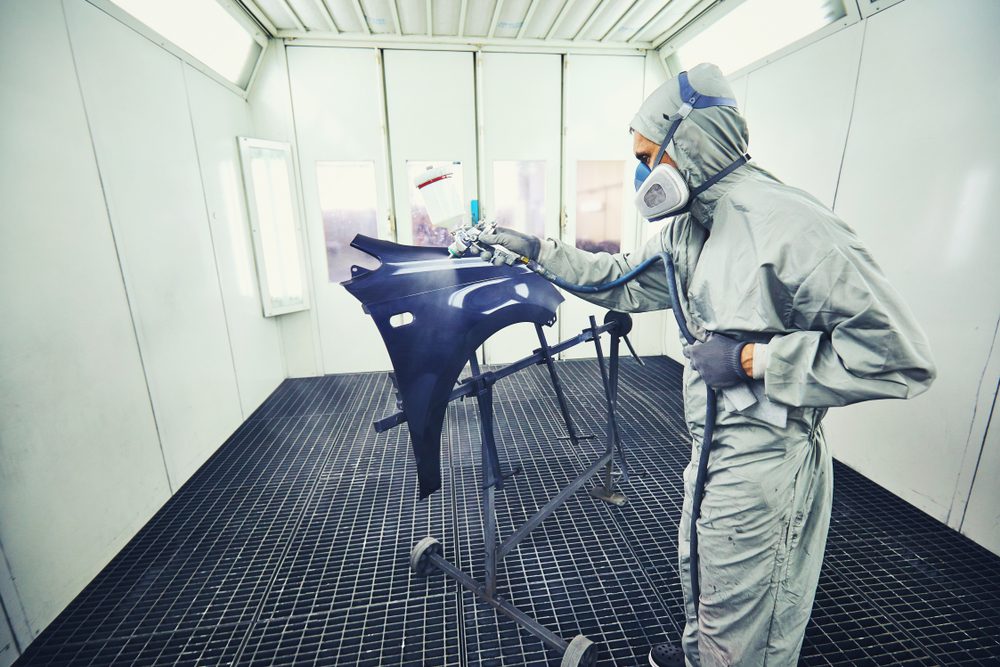Read Time: 3 minutes
Article Summary
- Every spray and finish booth require comprehensive, routine upkeep and maintenance to run efficiently and safely.
- Routine inspections should include virtually every part of the booth, but there are a few parts that require more attention than others, including: exhaust air filters, motors and belts, fans, exhaust ducts and door seals.
- The rate of filter changing hinges on several factors, including: type of filters, specific booth operations and frequency of use.
- Motor mechanisms are essential to the basic functions of the booth, so owners need to maintain them according to design specifications and usage. Operators also need to inspect all motor belts to make sure they are intact and have sufficient tension.
- Everyone who works with the spray booth should be fully trained to understand its controls and other indicators on the booth so that the booth operates correctly and within the manufacturer’s standards.
- Establishing customized schedules for basic tasks, like changing filters or cleaning fans, can help operators maximize the lifespan of each component without risking overuse.
Neglecting spray booth maintenance is an easy mistake, but it’s one that most operators don’t make a second time. Every spray and finish booth requires comprehensive upkeep and maintenance to run efficiently and safely. Even something as simple as dirty filters can cause airflow problems in the booth and not run properly. This can affect the finish quality of the part being sprayed but can also pose a significant health hazard to workers and may put the site in violation of environmental or occupational safety regulations.
Free eBook: Are you ready for a new spray booth?
Spray Booths: What Can Go Wrong?
Like any other piece of machinery, spray booths have multiple components that suffer from wear and tear during normal operations. Routine inspections should include virtually every part of the booth, but there are a few parts that require more attention than others, including:
- Exhaust Air filters
- Exhaust Fan Motors and belts
- Exhaust Fans and ducts
- Door Seals
Filters are always a primary maintenance concern for spray booths. The rate of filter changing hinges on several factors, including:
- Type of filter
- Specific booth operations
- Frequency of use
The use of a “manometer” or “draft gauge” monitors the exhaust filter pressure and provides an indication as to when the filters need to be changed.
Operators also need to consistently clean fan blades, housing, and ducts for both supply and exhaust airflow.
Most booths use electric motors and are essential to the basic functions of the booth, so owners need to maintain them according to design specifications and usage. Operators also need to inspect all motor belts to make sure they are intact and have sufficient tension. Seals around the entrance also need to be changed on a regular basis to ensure a complete lock on all airflow while the booth is on.
Learn to Spot Common Warning Signs
When it comes to spray booth operations, any change in performance or work experience should be investigated. Booths should be vacated immediately and examined by a professional if workers inside report difficulty breathing, chest pain, or any other unusual symptoms. Hazardous incidents are usually preceded by early warning signs, like visibly weaker exhaust flow or a strong chemical odor inside the booth.
Everyone who works with the spray booth should be fully trained to understand signal lights and other indicators on the booth or its interface. Air quality monitors and other indicators can provide early warning of a potential problem before it causes a malfunction in the booth or exposes anyone to a toxic hazard. All booth workers need to have all of the necessary safety gear and be taught how to use them properly.
Create a Customized Booth Maintenance Schedule
The best way to create an effective spray booth maintenance plan is to talk to the booth designers and engineers who can carefully evaluate the expected demand for the unit. Maintenance needs are typically separated into categories based on frequency including weekly, monthly, semi-annually, and yearly. Establishing a customized schedule for basic tasks, like changing filters or cleaning fans, can help operators maximize the lifespan of each component without risking overuse.
Creating an accurate schedule requires an intimate understanding of all the components in the booth design, which is why we are happy to share our expertise with our customers. As a designer and manufacturer of advanced spray booths, Spray Systems understands the challenges operators face and how we can help them get as much long-term value out of their booths as possible. At Spray Systems, we have a staff of professionally-trained individuals who can support you with any problems or questions you may have. For information on spray booth maintenance, contact us here.


